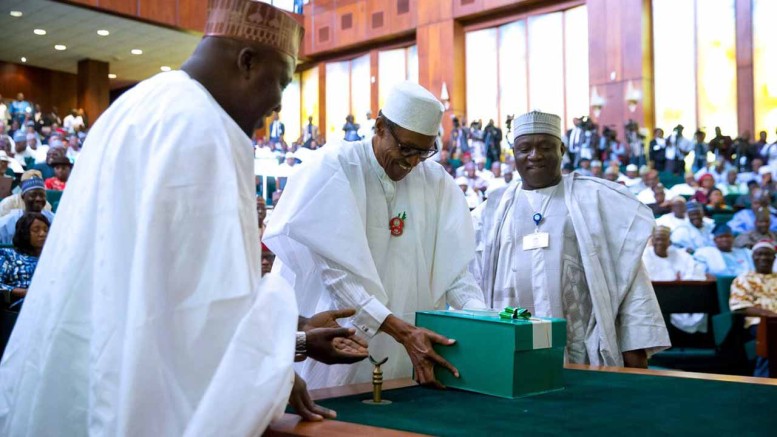The Nigerian president Muhammadu Buhari on Tuesday presented the 2018 proposed budget to a joint session of the National Assembly in Abuja.
According to the president, the budget will consolidate on the achievements of previous budgets and help actualize the Nigeria’s Economic Recovery and Growth Plan (ERGP) 2018-2020.

President Muhammadu Buhari (C) presenting copies of the 2017 budget documents to the National Assembly on Wednesday, December 14, 2016.
Here are key benchmarks:
Proposed Expenditure for 2018
A total expenditure of N8.6 trillion is proposed for the year 2018, representing an increase of 16 percent when compared with the 2017 budget of N7.44 trillion.
Expenditure breakdown shows N3.494 trillion is to be spent on recurrent expenditure, while N2.014 trillion will be used to service national debt, statutory transfers, sinking fund and capital expenditure are to cost N456 billion, N220 billion and N 2.43 trillion, respectively.
Collectable Revenue Estimates for 2018
The Federal Government estimated a total revenue of N6.607 trillion in 2018, up by about 30 percent from the 2017 budget. This comprises of N2.442 trillion of oil revenues and non-oil (and other revenues) of N4.16 trillion.
“Non-oil and other revenue sources of 4.165 trillion Naira, include several items including: Share of Companies Income Tax (CIT) of 794.7 billion Naira, share of Value Added Tax (VAT) of 207.9 billion Naira, Customs & Excise Receipts of 324.9 billion Naira, FGN Independently Generated Revenues (IGR) of 847.9 billion Naira, FGN’s Share of Tax Amnesty Income of 87.8 billion Naira, and various recoveries of 512.4 billion Naira, 710 billion Naira as proceeds from the restructuring of government’s equity in Joint Ventures and other sundry incomes of 678.4 billion Naira,” the president said.












Leave A Comment